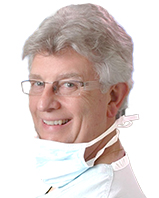Radial Apical Cleansing
Successful management of the apical third of root canal systems has long been considered to be the most significant and challenging aspect of endodontic therapy.
This is especially true in the treatment of apical periodontitis, where elimination of microorganisms is considered to be of the utmost importance for successful clinical outcomes. Significant, because the apical third contains the most important portals of exit of the root canal system to the periradicular area. Challenging, because it is the least accessible part of root canal systems with the most variation in anatomy, making cleaning and disinfection a daunting task. In addition,“successful management” needs to be achieved with minimal alteration to the original canal anatomy while maintaining tooth strength by preserving as much tooth structure as possible.
This lecture will review the importance and complexities of the apical third of root canal systems and will present a new, minimally invasive, treatment concept, Radial Apical Cleansing, for successful management of this critical area. Clinical situations such as loss of patency due to calcification, blockages, ledging or complex canal anatomy will be addressed. This predictably successful protocol for apical cleansing will improve outcomes, promote confidence as well as reduce chair-time for dentists and their patients when addressing these clinical situations.
At conclusion, participants should be able to:
- Comprehend the complex anatomy of the apical third of root canal systems and how it may influence the clinical outcome of endodontic treatment
- Appreciate the technical difficulty involved in the cleaning and disinfecting of this mostly inaccessible region of the root canal systems.
- Recognize the role of apical patency and how it may influence treatment outcomes in teeth with apical periodontitis.
- Understand the concept of laser-assisted, Apical Radial Cleansing and how it can successfully clean and disinfect the apical third of root canal systems, even when blockages prevent passage of an endodontic instrument.
Release date: Sun, November 27, 2011
Speaker: Justin Kolnick, DDS
 In 1977, Dr. Kolnick received his dental degree, cum laude from the University of the Witwatersrand, in Johannesburg, South Africa. He was the first dental school graduate to be awarded the prestigious University Scholarship for Overseas Postgraduate Study. In 1982, he completed his postdoctoral endodontic training at Columbia University School of Dental and Oral Surgery in the City of New York.
In 1977, Dr. Kolnick received his dental degree, cum laude from the University of the Witwatersrand, in Johannesburg, South Africa. He was the first dental school graduate to be awarded the prestigious University Scholarship for Overseas Postgraduate Study. In 1982, he completed his postdoctoral endodontic training at Columbia University School of Dental and Oral Surgery in the City of New York.
For the past 35 years, Dr. Kolnick has been in private practice limited to endodontics in Westchester County, NY. His practice, Advanced Endodontics of Westchester, is dedicated to fostering excellence in endodontics through education and the incorporation of the latest technology. In 2011, Dr. Kolnick created The Endodontic Microsurgery Group in a unique, state-of-the-art facility dedicated entirely to endodontic microsurgery.
Dr. Kolnick has been committed to endodontic education, first as an Associate Clinical Professor in Endodontics at Columbia University and then as an Attending at Westchester Medical Center and an Associate Clinical Professor in Endodontics at New York Medical College. Although he no longer holds these positions, he continues to lecture extensively on a local, national and international level and has published several articles on endodontics
Lessons
Radial Apical Cleansing
Phone: 888.584.3237; 702.341.7978
Fax: 702.341.8510



